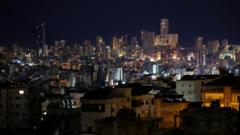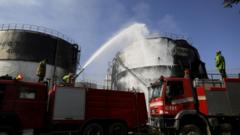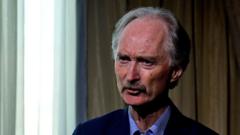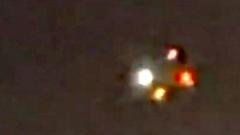The recently agreed ceasefire between Israel and Hezbollah, brokered by the US and France, aims to mitigate over a year of intense conflict that claimed thousands of lives and displaced many more. As both sides prepare for the terms of withdrawal and expect peace restoration, the political implications of this agreement may reshape relationships in the region and influence ongoing tensions with Hamas.
Temporary Ceasefire Between Israel and Hezbollah Marks New Phase in Longstanding Conflict

Temporary Ceasefire Between Israel and Hezbollah Marks New Phase in Longstanding Conflict
A ceasefire between Israel and Hezbollah has taken effect, signaling a potential shift in regional dynamics following prolonged hostilities and suffering in Lebanon.
A ceasefire between Israel and the Iran-backed militant group Hezbollah has officially begun, marking a significant pause in over a year of fighting that resulted in extensive casualties and destruction in Lebanon. The agreement took effect at 4:00 local time (02:00 GMT) on Wednesday, following a collaborative announcement by Israel, the US, and France, with President Joe Biden expressing hopes for a "permanent cessation of hostilities."
Despite the ceasefire, both parties continued launching attacks until moments before the deadline. Israel issued evacuation orders in Beirut, targeting areas near Hezbollah's stronghold, while the militant group reportedly deployed drones into Israeli territory as hostilities escalated. The ceasefire's immediate aftermath saw conflicting reports of civilians returning to southern Lebanon—an indication of the precarious nature of this truce.
The outlined ceasefire deal stipulates that Israel will gradually withdraw its forces from southern Lebanon over a period of 60 days. Concurrently, Hezbollah is expected to withdraw its personnel and armaments south of the Litani River, a demarcation established after the last significant conflict in 2006. This withdrawal will be replaced by Lebanese government forces to ensure a semblance of stability.
Lebanon's Prime Minister, Najib Mikati, hailed the ceasefire as a crucial move towards restoring stability, urging Israel to fully comply with the terms laid out. Meanwhile, Israeli Prime Minister Benjamin Netanyahu has warned that Israel remains prepared to respond with force should Hezbollah breach the agreement, asserting that Israel has the right to defend itself under international law.
While public sentiment in Israel appears divided on the ceasefire—with a recent poll showing mixed opinions—Netanyahu emphasized that reducing hostilities with Hezbollah would enable Israel to redirect its military focus toward the ongoing conflict with Hamas. Security assessments suggest that with Hezbollah's arsenal severely compromised, Israel may gain a strategic advantage, thereby intensifying pressure on Hamas.
The recent fighting, which began in October 2023 following Hezbollah's retaliatory rocket fire in response to the Israel-Palestine conflict, has resulted in around 3,800 deaths in Lebanon, alongside a million displaced citizens seeking refuge from the violence. As the ceasefire is in its initial phase, both international observers and regional stakeholders will be closely monitoring its implementation and potential impact on broader geopolitical tensions in the Middle East.
The U.S. has clarified that no troops will be deployed to enforce the ceasefire, yet there is hope that this interim peace may also catalyze renewed negotiations regarding the Gaza situation, currently stalled amid ongoing hostilities. The outcome of these discussions remains pivotal in reshaping alliances and power balances in the region.


















